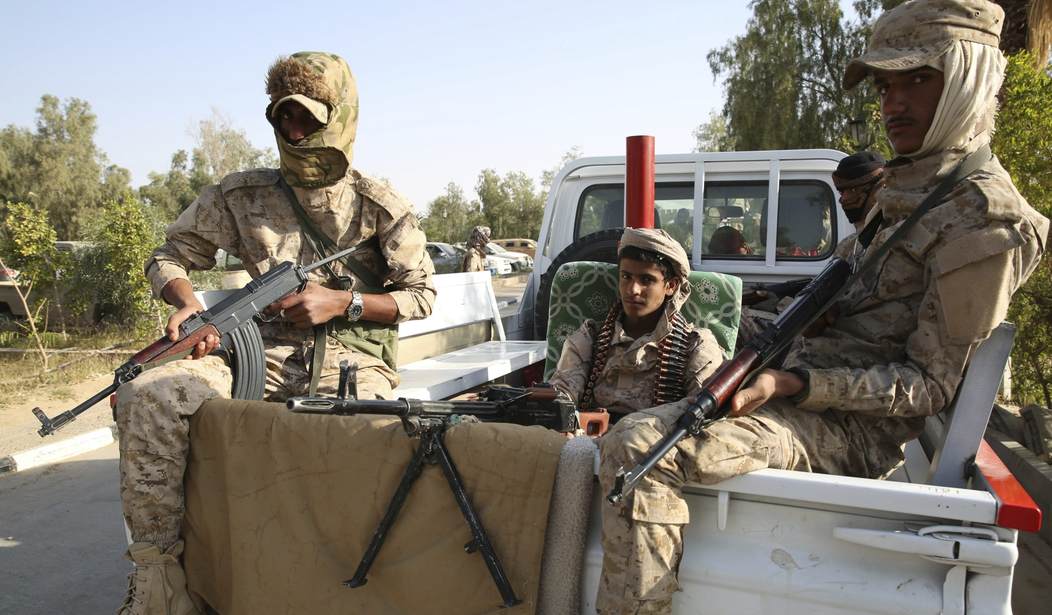WASHINGTON — Sens. Mike Lee (R-Utah) and Bernie Sanders (I-Vt.) will join forces with Sen. Chris Murphy (D-Conn.) on Wednesday to introduced a resolution that would let lawmakers pull the U.S. out of involvement in the Yemen conflict.
The bipartisan coalition plans to force the first-ever vote in the Senate pursuant to the War Powers Resolution on whether to withdraw U.S. armed forces from a conflict not authorized by Congress.
The Yemen civil war has been raging since March 2015, with the U.S.-backed Saudis supporting the government of President Abdrabbuh Mansur Hadi and Iran and Hezbollah backing the Houthi rebels — this while al-Qaeda in the Arabian Peninsula controls a large chunk in the center of the Mideast country. More than 5,000 civilians have been killed in the fighting and more than 3 million Yemenis have been displaced.
The U.S. has been supplying the Saudis with arms and intelligence, and the arrangement that started under President Obama hasn’t shown signs of abating as President Trump enjoys a warm relationship with Riyadh.
Sanders, Lee and Murphy will launch their quest on fertile ground, as many lawmakers have long grumbled about how they’ve been left out of America’s Yemen involvement. In November, the House passed a non-binding resolution 366-30 noting that the powers granted by Congress to fight terrorism in the region don’t extend to fighting Houthis in the Yemen war.
“Congress has not enacted specific legislation authorizing the use of military force against parties participating in the Yemeni civil war that are not otherwise subject to” the 2001 Authorization for Use of Military Force or the 2003 AUMF in Iraq, the resolution stated.
Lee was among the GOP lawmakers in the upper chamber who tried to stop a $1.15 billion arms sale from the Trump administration to the Saudis last summer. The bill fell short of advancing by just a few votes, as Sens. Rand Paul (R-Ky.) Todd Young (R-Ind.) and Dean Heller (R-Nev.) joined the majority of Democrats trying to advance it. Sens. Joe Donnelly (D-Ind.), Claire McCaskill (D-Mo.), Bill Nelson (D-Fla.), Joe Manchin (D-W.Va.) and Mark Warner (D-Va.), however, voted against advancing the legislation.
In September, Paul spoke out on the Senate floor against continued U.S. involvement without congressional authorization. “We’re at war in Yemen. We are aiding and abetting the Saudi war in Yemen. And yet there’s been no vote on it. 17 million people live on the edge of starvation, because of the Saudi blockade and bombing campaign. We are aiding and abetting that, and yet there’s been no vote here in Congress,” he said.
“…If you look at humanitarian disasters around the world, you’ll find the number one cause is war. And Yemen was already a poor place to begin with. But you’re fighting the war and nobody asked your permission. You’re fighting a war in Yemen through the proxy of Saudi Arabia and no one has asked my permission … we have no business in Yemen. We’ve not voted to go to war in Yemen.”
On the Senate floor in September, Lee backed Paul’s resolution of disapproval on the arms sale and noted that bipartisan discontent “simply proves that there are many reasons to reconsider this arms deal with Saudi Arabia.”
“Is intervening in this civil war a national priority for the American people? Astoundingly, this is a question that has never been fully discussed or debated in this institution… this is more than an abdication of responsibility by Congress – it is a national security hazard,” Lee said. “…Let us pause our intervention in this foreign conflict and show the country that the Legislative Branch can responsibly fulfill its obligations to the American people – that we can openly and thoughtfully evaluate our interventions abroad, and that we are focused on protecting the security, safety, and interests of the American people.”
In a September foreign policy speech, Sanders called the Yemen war an example of the United States “supporting policies that I believe will come back to haunt us.”
“While we rightly condemn Russian and Iranian support for Bashar al-Assad’s slaughter in Syria, the United States continues to support Saudi Arabia’s destructive intervention in Yemen, which has killed many thousands of civilians and created a humanitarian crisis in one of the region’s poorest countries,” Sanders said. “Such policies dramatically undermine America’s ability to advance a human rights agenda around the world, and empowers authoritarian leaders who insist that our support for those rights and values is not serious.”









Join the conversation as a VIP Member